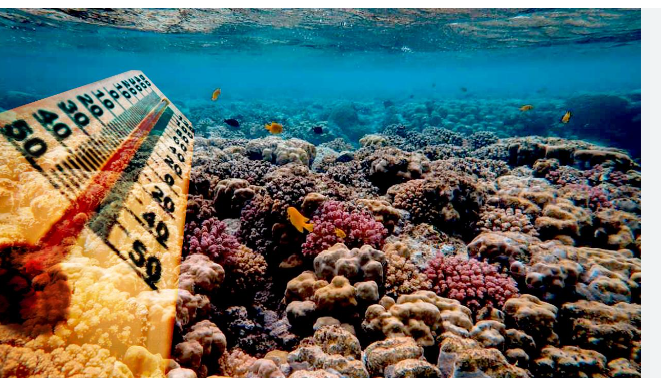Middle East Technical University (METU) Marine Sciences Institute Director Prof. Dr. Barış Salihoğlu claims that the Mediterranean is the region most affected by climate change in Turkey. As the temperature increases in the region, sea water temperatures also increase, jeopardizing fishing and tourism.
Referring to the effect of climate change on the surface water temperatures of the Mediterranean, Salihoğlu said, “We have observed an increase of over 2 degrees in regions such as Mersin Bay and İskenderun Bay in the last 40 years. This stands out as a serious temperature increase for our country’s seas. The temperature increase in the Mediterranean reaches an average of 1.5 degrees. “Similarly, temperature increases of 1.5 degrees are experienced off the coast of Antalya Bay,” he said.
Explaining that the water condensing with increasing salinity on the surface sinks and effects marine life in the depths, Salihoğlu continued as follows: “The deep sea generally has a very fragile structure, even small temperature changes affect the ecosystem. Even more frightening, there are cycles in the Mediterranean, like the general cycles in major current systems around the world, which regulate life. These cycles will gradually change with increasing temperatures”. “At that point, the situation will reach a threshold level for the ecosystem because increasing temperatures may result in life forms changing their habitats.”
It is necessary to increase ecosystem resilience
Salihoğlu stated that climate change causes acidification in the sea, which causes especially species containing calcium (crustaceans) to change their structure or die. Changes to the migration and breeding habits of fish are likely underway.
Salihoğlu made the following suggestions: “We do not have a solution to the physical impact of climate change on the seas, temperatures have increased, the ocean has become acidified. In the best scenario, even if we stop temperature increases at 1.5-2 degrees, the impact on marine life will continue to accumulate.
We need to strengthen the marine ecosystem here, and the only way to do this is to reduce other pressures. It is necessary to reduce pressures such as pollution, hunting and construction, and increase biodiversity and ecosystem resilience. One of the ways to achieve this is to increase protected areas. We are not saying ‘Let’s protect the existing situation’, but ‘Let’s make the existing environment healthier’, because the current situation is unhealthy.”
Coral reefs dying, ecosystem in danger
Dokuz Eylül University Institute of Marine Sciences and Technology, Head of Marine Sciences Department, Prof. Dr. Şükrü Turan Beşiktepe said, “While the atmospheric temperature is 1.1 degrees higher than the pre-industrial period, this value is 1.5 degrees in the Mediterranean. If this trend continues, the warming is predicted to reach 2.2 degrees in 2040. “The western Mediterranean has warmed by 0.35 degrees in the last 10 years, the Eastern Mediterranean has warmed by 0.5 degrees, and there is a 0.25 degree warming in the Atlantic Ocean.”
Warning that overheating in the sea will affect the spawning seasons and stocks of fish, and that water quality on the coasts will deteriorate with the deterioration of coral reefs and sea meadows, Beşiktepe said, “The Eastern Mediterranean is experiencing a tropicalization process because it is warming more than the west.
The coral reefs in this eco-zone are called ‘cold water coral reefs’ and when the sea water rises above 26-27 degrees, they cannot adapt, dying quickly. It is estimated that coral reefs unique to the Mediterranean will disappear in the next 15-20 years. “This will completely destroy the entire ecosystem,” he said.
Source: Akdeniz’de rekor ısınma
Follow our English language YouTube videos @ REAL TURKEY: https://www.youtube.com/channel/UCKpFJB4GFiNkhmpVZQ_d9Rg
And content at Twitter: @AtillaEng
Facebook: Real Turkey Channel: https://www.facebook.com/realturkeychannel/
